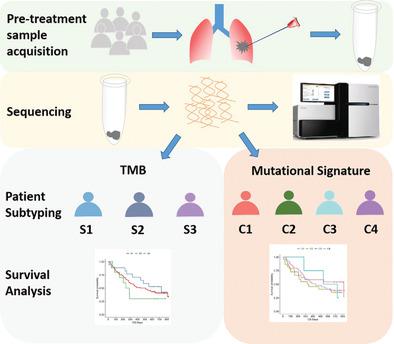Our official English website, www.x-mol.net, welcomes your
feedback! (Note: you will need to create a separate account there.)
Mutational Profile Evaluates Response and Survival to First‐Line Chemotherapy in Lung Cancer
Advanced Science ( IF 14.3 ) Pub Date : 2020-12-30 , DOI: 10.1002/advs.202003263 Yayi He 1 , Lele Song 2, 3 , Hao Wang 1 , Peixin Chen 1 , Yu Liu 1 , Hui Sun 1 , Xiaobin Li 2 , Shiying Dang 2 , Guifeng Liu 2 , Xinyi Liu 2 , Shifu Chen 2 , Xiaoni Zhang 2, 4 , Paul Hofman 5 , Junji Uchino 6 , Henry S Park 7 , Jose M Pacheco 8 , Fabrizio Tabbò 9 , Mingyan Xu 2 , Jiawei Dai 10 , Kan He 10 , Yang Yang 11 , Caicun Zhou 1 ,
Advanced Science ( IF 14.3 ) Pub Date : 2020-12-30 , DOI: 10.1002/advs.202003263 Yayi He 1 , Lele Song 2, 3 , Hao Wang 1 , Peixin Chen 1 , Yu Liu 1 , Hui Sun 1 , Xiaobin Li 2 , Shiying Dang 2 , Guifeng Liu 2 , Xinyi Liu 2 , Shifu Chen 2 , Xiaoni Zhang 2, 4 , Paul Hofman 5 , Junji Uchino 6 , Henry S Park 7 , Jose M Pacheco 8 , Fabrizio Tabbò 9 , Mingyan Xu 2 , Jiawei Dai 10 , Kan He 10 , Yang Yang 11 , Caicun Zhou 1 ,
Affiliation

|
Evaluating the therapeutic response and survival of lung cancer patients receiving first‐line chemotherapy has always been difficult. Limited biomarkers for evaluation exist and as a result histology represents an empiric tool to guide therapeutic decision making. In this study, molecular signatures associated with response and long‐term survival of lung cancer patients receiving first‐line chemotherapy are discovered. Whole‐exome sequencing is performed on pretherapeutic tissue samples of 186 patients [145 non‐small cell lung cancer (NSCLC) and 41 small cell lung cancer (SCLC)]. On the basis of genomic alteration characteristics, NSCLC patients can be classified into four subtypes (C1–C4). The long‐term survival is similar among different subtypes. SCLC patients are also divided into four subtypes and significant difference in their progression free survival is revealed (P < 0.001). NSCLC patients can be divided into three subtypes (S1–S3) based on TMB. A trend of worse survival associated with higher TMB in subtype S3 than in S1+S2 is found. In contrast, no significant correlations between molecular subtype and therapeutic response are observed. In conclusion, this study identifies several molecular signatures associated with response and survival to first‐line chemotherapy in lung cancer.
中文翻译:

突变谱评估肺癌一线化疗的反应和生存
评估接受一线化疗的肺癌患者的治疗反应和生存率一直很困难。用于评估的生物标志物有限,因此组织学代表了指导治疗决策的经验工具。在这项研究中,发现了与接受一线化疗的肺癌患者的反应和长期生存相关的分子特征。对 186 名患者的治疗前组织样本进行全外显子组测序 [145 名非小细胞肺癌 (NSCLC) 和 41 名小细胞肺癌 (SCLC)]。根据基因组改变特征,NSCLC患者可分为四种亚型(C1-C4)。不同亚型之间的长期生存率相似。 SCLC 患者也分为四种亚型,其无进展生存期存在显着差异( P < 0.001)。根据TMB可将NSCLC患者分为三个亚型(S1-S3)。与 S1+S2 亚型相比,S3 亚型存在与较高 TMB 相关的较差生存趋势。相反,没有观察到分子亚型和治疗反应之间存在显着相关性。总之,本研究确定了与肺癌一线化疗的反应和生存相关的几个分子特征。
更新日期:2021-02-17
中文翻译:

突变谱评估肺癌一线化疗的反应和生存
评估接受一线化疗的肺癌患者的治疗反应和生存率一直很困难。用于评估的生物标志物有限,因此组织学代表了指导治疗决策的经验工具。在这项研究中,发现了与接受一线化疗的肺癌患者的反应和长期生存相关的分子特征。对 186 名患者的治疗前组织样本进行全外显子组测序 [145 名非小细胞肺癌 (NSCLC) 和 41 名小细胞肺癌 (SCLC)]。根据基因组改变特征,NSCLC患者可分为四种亚型(C1-C4)。不同亚型之间的长期生存率相似。 SCLC 患者也分为四种亚型,其无进展生存期存在显着差异( P < 0.001)。根据TMB可将NSCLC患者分为三个亚型(S1-S3)。与 S1+S2 亚型相比,S3 亚型存在与较高 TMB 相关的较差生存趋势。相反,没有观察到分子亚型和治疗反应之间存在显着相关性。总之,本研究确定了与肺癌一线化疗的反应和生存相关的几个分子特征。











































 京公网安备 11010802027423号
京公网安备 11010802027423号